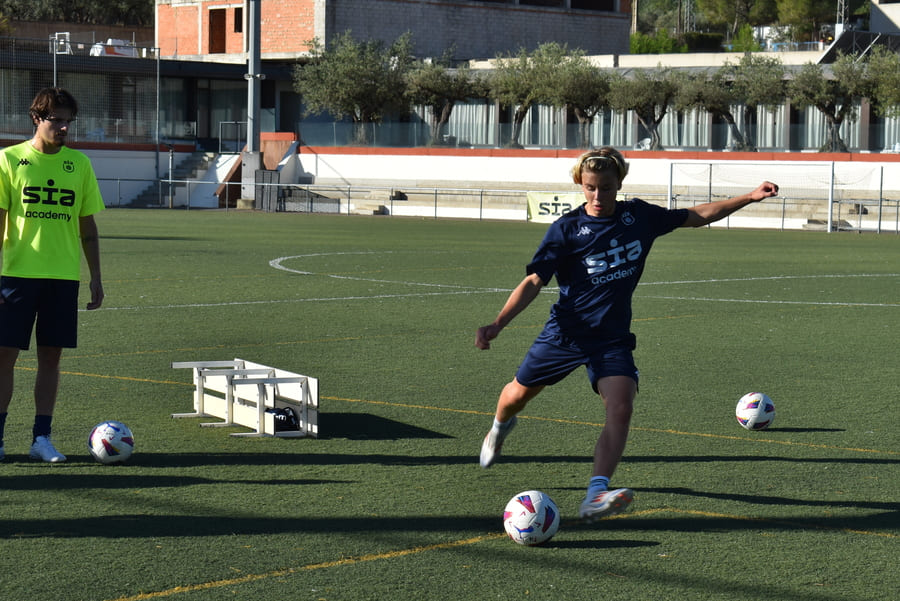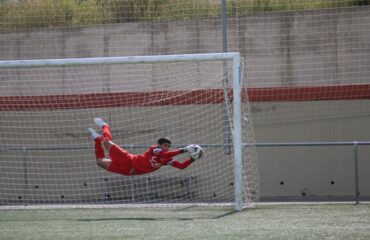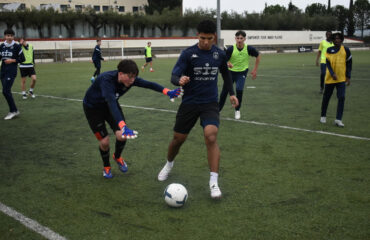Success in football depends on a combination of diverse skills . These skills are divided into technical, tactical, physical and mental , each playing a crucial role in a player’s performance. Developing these capabilities is essential to excel on the pitch. From ball control to mental strength, each aspect contributes to the development of a complete footballer. There are specific High Performance programs that allow you to train to acquire the necessary skills.
Table of contents
Technical Skills
Technical skills are fundamental for any footballer. These abilities not only allow players to execute plays accurately, but are also essential for maintaining control of the game and contributing to the team’s overall performance.
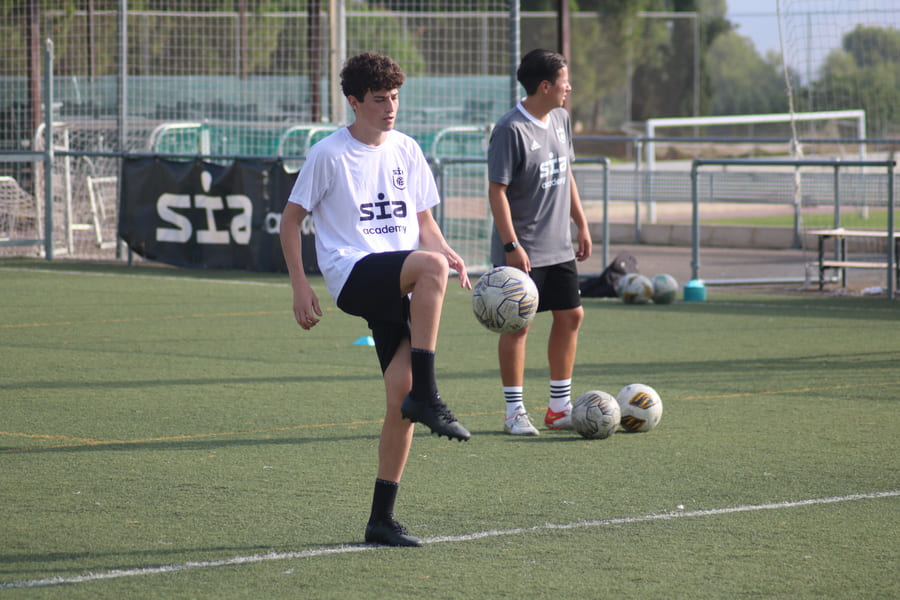
Ball Control
Ball control is one of the most important skills a footballer can develop. Good ball control allows a player to manipulate the ball effectively, which is crucial at all stages of the game.
Using Your Feet for Control
The feet are the player’s main tools for controlling the ball. Skill in using the feet is trained through specific exercises that teach how to receive, pass and shoot accurately. Techniques such as subtle touch and the use of the inside and outside of the foot are essential for various playing contexts.
Chest and Head Control
In addition to the feet, the chest and head are vital for effective ball control. Using the chest to cushion the impact of the ball helps maintain possession in difficult situations. Aerial control with the head is also crucial, especially for clearing balls or passing to teammates in aerial situations.
Maintaining Possession of the Ball
The ability to maintain possession of the ball in the face of pressure from opponents is crucial. This involves not only technical control, but also a tactile understanding of the environment and anticipation of the opponent’s movements. As a result, a good player must be able to protect the ball and make quick decisions about his next actions.
Bargaining
Dribbling is a skill that allows players to get past defenders and create attacking opportunities. It is a skill that combines ball control with the ability to move with agility and creativity.
Effective Bargaining Techniques
Effective dribbling is based on techniques that allow a player to get away from defenders. This includes the use of changes of pace, lateral movements and feints that disconcert the opponent. Constant practice of these techniques is essential to the development of a skilled dribbler.
Movements in Different Directions
The ability to move in different directions while controlling the ball is crucial. Players must be able to change trajectory quickly to evade opponents. This skill is reinforced through agility and coordination drills that allow for better management of space on the field.
Outperforming Opponents
Dribbling past an opponent is not only a matter of technique, but also of game intelligence. Anticipating the defender’s moves and choosing the right moments to dribble are key factors in being successful in this area.
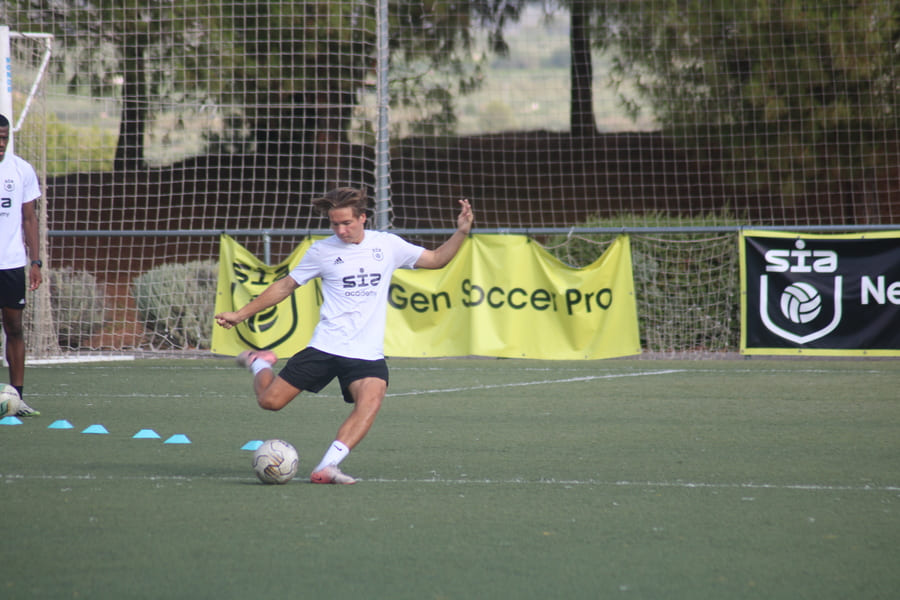
Passing Accuracy
Passing accuracy is essential to maintaining possession and creating scoring opportunities. A player who can pass the ball accurately can change the dynamic of a game quickly.
Short and Long Passes
There are different types of passes, with short and long passes being the most common. Short passes allow you to maintain possession and move the ball quickly, while long passes are ideal for changing play or looking for a run. Each type of pass requires a specific technique to be executed perfectly.
Passing the Ball with Precision
The ability to accurately pass the ball to a teammate is essential. A wrong pass can lead to loss of possession and create opportunities for the opposition. Training sessions often include drills specifically designed to improve passing accuracy in different game situations.
Create Attack Opportunities
A player who can pass accurately and properly can open up gaps in the opposing defence. The ability to anticipate teammates’ movements and choose the right moment to pass is what turns a good pass into an effective attacking opportunity.
Body Control
Body control is a player’s ability to maintain balance and coordination while moving around the field. This skill is essential for executing technical movements effectively and for reacting to unexpected situations.
Balance and Coordination
Good balance allows a player to remain stable and in control, even in pressure situations. Coordination, meanwhile, is essential for fluid movements and for interacting effectively with the ball. Balance and coordination exercises are fundamental in the training of footballers.
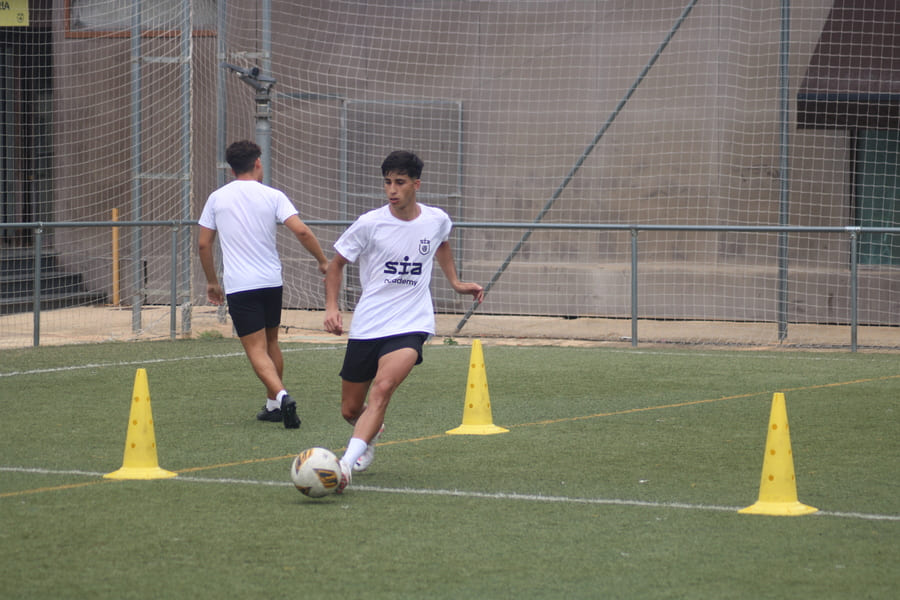
Optimizing Agility
Agility refers to the ability to change direction and speed quickly. This is essential for good performance in football, as the game can change in an instant. Specific training that combines running, jumping and changing direction helps to improve this skill.
Responding to Unexpected Situations
Football is a dynamic sport and will constantly change. The ability to respond quickly and effectively to unexpected situations can be the difference between maintaining possession or losing the ball. This requires a high level of concentration and the ability to make quick decisions based on the game situation.
Game Intelligence
Game intelligence is a fundamental quality in football that allows players to make appropriate decisions in changing situations. This skill is based on the ability to observe, analyse and anticipate actions, thus optimising performance on the field.
Spatial Awareness
Spatial awareness is the ability of footballers to understand and explore the space on the field. This skill translates into better decision making and more effective execution of plays.
Field Perception
Field awareness involves a player’s ability to visualise the layout of others, their own position and the ball. This ability allows players to allocate space for themselves and anticipate the movement of opponents. A player with good field awareness can quickly assess the surroundings and position themselves optimally to receive or pass the ball.
Taking Advantage of Empty Spaces
Identifying and exploiting empty spaces is crucial in football. Players must be able to recognise opportunities when the opposition is disorganised. Being aware of these empty spaces allows footballers to create opportunities, facilitating more fluid and effective play. This skill not only focuses on ball movement, but also on proper positioning.
Positioning Yourself Against Opponents
Positioning oneself strategically in front of opponents is a vital skill. Players must know when to press, when to back off and how to create space for themselves and their teammates. This requires an advanced understanding of the game and an ability to anticipate the opponent’s actions, thus maximising the chances of success in moves.
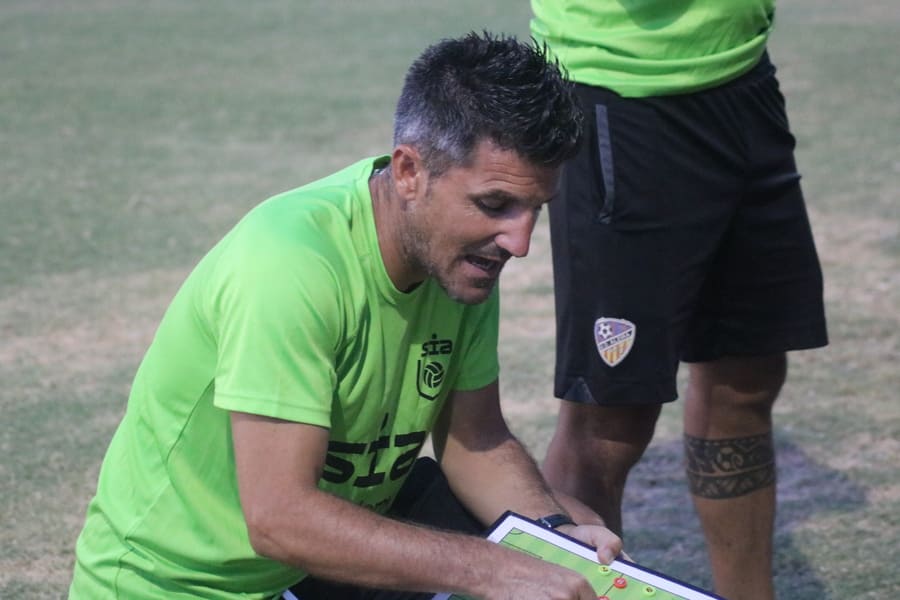
Tactical Knowledge
Tactical knowledge allows players to adapt to different formations and playing styles. Understanding the strategy behind each match facilitates a more consistent execution of the tactics developed by coaches.
Understanding Team Formations
Knowing the various team formations is essential for versatility on the field. Each formation serves a different purpose and affects the dynamics of the game. Understanding these formations allows footballers to know not only what their role is, but also how to interact with their teammates to maximize the team’s effectiveness.
Adaptation to Different Strategies
Players must be prepared to adapt to different geographical strategies and the decisions of their opponents. This adaptability translates into better game management and keeps the team in a position of advantage. Recognizing the moments to change strategy is part of the tactical knowledge that is developed through experience and training.
Making Informed Decisions
The ability to make informed decisions in critical situations is essential for any player. These decisions must be made in fractions of a second and can determine the outcome of a play. A footballer must quickly assess the available options and choose the most effective action, based on his knowledge of the game and the intuition acquired over time.
Risk assessment
Risk assessment is crucial in football. Players have to weigh up the options available to them and decide how best to move forward without compromising the team’s position.
Aggressive Decisions
Making aggressive decisions can be beneficial in certain situations. Footballers must know when to take risks to gain an advantage and create opportunities for the team. However, this aggression must be measured and calculated, ensuring that it does not jeopardise possession of the ball.
Balance between Aggression and Strategy
The balance between aggression and strategy is a vital aspect of maintaining a cohesive team structure. A successful player must find the right balance between pressing and playing conservatively, which involves a deep understanding of the game context and a constant assessment of the circumstances.
Minimize Loss of Possession
Minimising the loss of possession is a constant goal in football. The ability to assess when to risk the ball and when to play it safe is critical. Maintaining possession can mean the difference between a successful attack and a missed opportunity, making this skill essential to the performance of the player and, ultimately, the team.
Physical Fitness
Physical fitness is an essential component for any footballer. It includes a combination of endurance, speed, balance, coordination, strength and power. These qualities are critical to optimising performance on the pitch, allowing players to perform effectively in high-pressure situations.
Endurance and Speed
Endurance and speed are abilities that allow players to maintain a high level of performance throughout the 90 minutes of a match. Endurance refers to the body’s ability to withstand physical activity over time, while speed involves moving quickly to position oneself in the right place.
Development of Aerobic Endurance
A footballer must work on his aerobic endurance in order to be able to run long distances without getting tired. This can be achieved through continuous training that includes long runs and cardiovascular exercises. Good endurance allows repeated efforts to be made and a constant performance to be maintained throughout the match.
Speed and Agility on the Field
The combination of speed and agility is crucial for success in football. Training should focus on sprints and drills that simulate match situations, such as quick changes of direction. Speed not only translates into quickness in running, but also the ability to react to the movement of the ball and opponents.
Quick Reaction to Plays
Reaction speed is vital in football. Players must be able to respond immediately to situations that arise during the course of the game. This requires a great deal of physical and mental preparation. Reaction drills, such as footwork and match simulations, help to improve this skill, making the player always ready to act.
Balance and Coordination
Balance and coordination are essential for efficient performance. Maintaining a correct posture during play and coordinating body movements are skills that are developed through specific training. Improving these abilities provides advantages in critical match situations.
Specific Training
Balance can be trained through exercises that challenge body position, such as balancing on one leg or using balance boards. Coordination is improved through activities that involve interaction between the feet and hands, such as ball handling or agility drills. Integrating these workouts into daily routines is essential for any footballer.
Quick Movements in Tight Spaces
Practicing quick movements in tight spaces helps players develop agility. Drills such as dribbling between cones or making short passes foster the ability to react quickly and move in pressure situations. Consistent practice is crucial to improving these skills in the real game.
Strengthening Stability
Stability refers to a player’s ability to maintain control over their body during movement. This involves intensive work on the central area of the body, known as the ‘core’. Exercises such as planks and stability on a pilates ball are excellent for strengthening this area and improving overall performance on the field.
Strength and Power
Strength and power are essential for interacting with other players and maintaining control of the ball. A good level of strength allows footballers to compete physically, whether in aerial duels or in situations of direct dispute for possession of the ball. Training should focus on developing these characteristics through specific exercises.
Physical Interaction with Opponents
Body strength is key when it comes to confronting opponents. Footballers must be able to sustain physical contact without losing their balance. Training sessions that simulate game situations, such as grappling and containment drills, are ideal for developing this skill. Practice allows players to feel comfortable and confident during physical clashes in the match.
Ball Protection
The ability to protect the ball from opponents depends on strength and body control. Footballers must learn to keep the ball away from opponents, using their body as a barrier. Ball protection drills, such as those performed in one-on-one training, are essential to developing this defensive technique.
Aerial Duel and Powerful Shots
In both aerial play and shooting, strength plays a crucial role. For aerial combat, a player needs to have good verticality, which is developed through jumping training and plyometric exercises. For powerful shots, leg strength is crucial, so exercises such as squats, deadlifts and weighted jumps should be included in the routine.
The Right Mindset
Developing the right mindset is critical to success in football. This mindset encompasses sacrifice, patience and great mental strength, all of which enable footballers to overcome challenges and constantly grow in their careers.
Sacrifice and Patience
The road to sporting success is full of challenges that require sacrifices and a considerable dose of patience. Footballers must be willing to put aside personal and social situations, prioritizing their development in sport. This commitment is essential to achieve the set goals, since football demands total dedication.
Investment in training
The development of a footballer does not happen overnight. Their progress depends on countless hours of training, practice and study of the game. Players who excel are those who invest time and effort in acquiring technical and tactical skills. Insistence on continuous improvement is key to reaching the highest levels in the sport.
Making Personal Decisions
Footballers often face difficult decisions that impact their career. These choices can range from selecting a club to committing to a specific training routine. Sacrificing moments of leisure or fun for rigorous training is a must. Reflecting on these decisions and evaluating their long-term effects can make the difference between success and stagnation.
Accepting the Growth Process
A footballer must understand that personal and professional growth is a process that takes time. Each player progresses at his own pace, and it is crucial to accept both successes and failures. Resilience in the face of defeats and the ability to learn from them are aspects that fuel development and improve performance on the field.
Mental Strength
Mental strength is another essential quality that separates successful players from those on the path to mediocrity. Maintaining concentration and coping with pressure are key in a match. Footballers must cultivate a robust mindset that allows them to overcome adversity and make sound decisions in critical situations.
Maintaining Focus Under Pressure
Football matches often involve intense pressure from both opponents and fans themselves. A player’s ability to maintain focus and not succumb to anxiety is a key indicator of success. Exercising the mind through concentration techniques and psychological preparation helps to deal with these critical moments effectively.
Overcoming Adversity
Footballers face various adversities throughout their careers. Injuries, painful defeats or controversial refereeing decisions are common situations that test mental strength. Knowing how to handle these situations, learn from them and come back even stronger is indicative of a solid mental profile. The ability to get up after a fall defines true champions.
Evolution as an athlete
A player’s growth involves not only techniques and tactics, but also a continuous evolution in his mentality. Understanding that every experience, good or bad, contributes to his personal development is fundamental. Learning new strategies, being open to receiving constructive criticism and the willingness to adapt are elements that enrich any footballer’s career. As this evolution progresses, self-confidence and self-assessment become essential tools for long-term success.
Development in Academies and Camps
The growth of a young footballer is greatly enhanced in specialized academies and camps. These environments offer a learning and competition structure that can be decisive in their development as athletes.
Training in Academies
Football academies are institutions dedicated not only to the development of technical skills, but also to the comprehensive training of players in their physical and mental aspects. Here, emphasis is placed on discipline and effort, offering an environment conducive to personal and sporting growth.
Competitive Environment
A competitive environment is essential for the development of young footballers. Academies often integrate players with different levels of skill and experience, creating a space where learning occurs constantly. This inherent competitiveness accelerates the development of skills and fosters a spirit of improvement.
Intensive Training
Training sessions at academy are rigorous and aim to maximise the performance of each player. These sessions include specific exercises to improve ball control, passing technique, and various game tactics. The intensity of the training helps players adapt and continually improve their fitness and football skills.
Importance of Interpersonal Relationships
Interaction between teammates is essential in an academy environment. Players not only learn to collaborate on the field, but also develop social skills that are vital for team play. Interpersonal relationships built in this context can make all the difference in collective performance during a match.
Summer Camps
Summer camps are an excellent opportunity for young soccer players to further develop their skills. These spaces are designed to offer technical instruction and encourage teamwork in a dynamic and fun environment.
Rigorous Technical Instruction
During the camps, participants receive intensive training in the technical aspects of the game. Sessions focus on improving skills such as dribbling, shooting, and defense. The guidance of specialized coaches provides players with constant feedback, facilitating effective and rapid learning.
Teamwork
Teamwork is an essential component of any football training program. Through joint exercises and friendly matches, participants learn to act as a cohesive unit. This learning provides the necessary tools to establish good communication and coordination on the field of play.
Development of Group Interaction
Camps also encourage bonding between players. Social interaction in a sporting context can help build a strong foundation of camaraderie and mutualism. Shared experiences on and off the field foster a sense of belonging that can be beneficial for players in the future.



